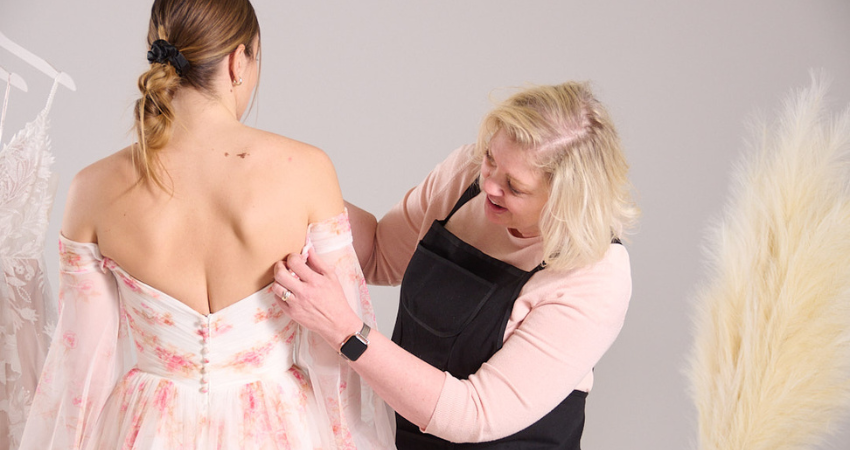Ask a #RealBride Dietician: How to REALLY Goal-Set for 2018

If you’re getting married this year or next then this blog post is MUST read. Nichola (one of our own Sottero and Midgley brides!) talks us through how to make our dietary and fitness goals actually work in order to get the results you want in time for your big day.
by Nichola Ludlam-Raine, Registered Dietitian at nicsnutrition.com and photography by nicsnutrition.com
With January over, and (for most of us), our New Year’s Resolutions now a distant memory, we’re going to look at how exactly to go about making long-term changes to your health and fitness levels, by setting GOALS.
 |
 |
You’ll notice that I say “goal setting” and not “resolution setting,” as the problem with setting resolutions is that the majority fail within the first few weeks—because there isn’t a specific plan in place to achieve them. The key to goalsetting is to plan what specific changes you are going to make in order to achieve your ultimate aim. As the saying goes, “If you always do what you’ve always done, you always get what you’ve always gotten.”
 |
Putting this into context, although your ultimate aim may be to “Lose the 5 lbs that you gained in December over the next 3 months,” your goals should be health behavior-focused, which involves looking at the quality of your diet, your activity levels, your sleeping habits, and your stress management techniques. All four of these will not only have a positive effect on your overall health but will help you with your weight loss efforts too. Focus on the journey rather than the destination, which means if you create appropriate health rituals, you will eventually get the result that you desire.
Whether you’re focusing on achieving your “5 a day,” exercising for 30 minutes / 5 times a week, sleeping for 7-8 hours a night or starting to meditate for 10 minutes a day, try the following steps to help you along your
way:
4 STEPS TO GOAL SETTING PROPERLY
1) Make your Goals SMART & write them down.
Don’t be wish-washy with your goals; make them Specific, Measurable, Achievable, Realistic and Time-bound, and write them down in a note-book or diary. For example, your aim may be to “increase your exercise levels,” but your goals should be behavior change-focused, i.e. based on HOW you are going to increase your exercise levels and get fit. A SMART goal based on fitness could be:
S= I am going to go to the gym 3 times a week for 60 minutes at a time.
M= At the gym I’m going to follow the program card written for me by a fitness instructor and put a tick in my diary when I go.
A= I’m going to go on my way back from work on a Monday, Tuesday, and Thursday, as I don’t have other commitments on these evenings.
R= I’m going to include at least 30 minutes of cardiovascular activities, e.g. interval training on the cross-trainer, to improve my overall cardiovascular fitness.
T= I’m going to start on Monday and track my progress for the next month.
 |
2) Add a WHY; Remember why you are doing the goal, for example if your goal is to increase your exercise levels (as above) note down the benefits that this will bring and highlight the ones which mean the most to you:
• Improved muscle tone which means a leaner and stronger body (you’ll also look incredible in your wedding dress!)
• Increased level of good cholesterol in the body
• Decreased risk of diseases such as coronary heart disease, stroke and cancer
• Increased self-esteem (confidence levels)
• Improved mood (it boosts the feel good hormones)
• Increased energy levels (leaving more energy to plan your wedding!)
• Improved sleep (leading to better energy levels!)
• Improved immune function, reducing the chances of getting ill on your big day
• Helps to boost metabolic rate and burn calories
• Contributes to weight loss and more importantly, keeping weight off
• Improves reaction time and coordination
 |
3) Get an Accountability Partner; Sharing your aims and goals is a great way of staying accountable. You could share your goal(s) with your mum, one of your bridesmaids, or even on social media. Check in every few weeks with an update on how you’re getting on and don’t be afraid to discuss any problems that you’re facing, as you may be able to work out a solution or a way around it together.
4) Review and Celebrate your Success; Decide how often you are going to review your progress; is it going to be every week, every other week or every month? When you review your progress it allows you to adapt your plan accordingly. For example, if your workout is getting too easy, do you need to change your workout regime, or if you’re already eating 5 portions of fruit and vegetables a day, can you add a new goal of swapping refined carbohydrates to whole grain (for example swapping white bread to whole-wheat bread).
I really hope this post helps you with your 2018 goal setting; whether you’re getting married this year or next! Good luck! Nic x
   |
Head over to Nic’s Nutrition for more fab tips for a healthy lifestyle!
Photographer: Fields Photography















